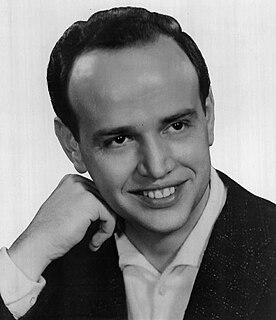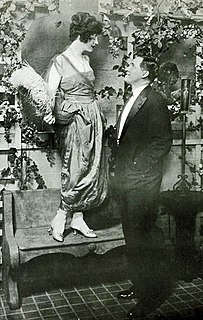Related Research Articles

Jerome David Kern was an American composer of musical theatre and popular music. One of the most important American theatre composers of the early 20th century, he wrote more than 700 songs, used in over 100 stage works, including such classics as "Ol' Man River", "Can't Help Lovin' Dat Man", "A Fine Romance", "Smoke Gets in Your Eyes", "The Song Is You", "All the Things You Are", "The Way You Look Tonight" and "Long Ago ". He collaborated with many of the leading librettists and lyricists of his era, including George Grossmith Jr., Guy Bolton, P. G. Wodehouse, Otto Harbach, Oscar Hammerstein II, Dorothy Fields, Johnny Mercer, Ira Gershwin and Yip Harburg.

Musical theatre is a form of theatrical performance that combines songs, spoken dialogue, acting and dance. The story and emotional content of a musical – humor, pathos, love, anger – are communicated through words, music, movement and technical aspects of the entertainment as an integrated whole. Although musical theatre overlaps with other theatrical forms like opera and dance, it may be distinguished by the equal importance given to the music as compared with the dialogue, movement and other elements. Since the early 20th century, musical theatre stage works have generally been called, simply, musicals.

Stephen Joshua Sondheim is an American composer and lyricist known for his work in musical theatre. One of the most important figures in 20th-century musical theatre, Sondheim has been praised for having “reinvented the American musical" with shows that tackle "unexpected themes that range far beyond the [genre's] traditional subjects" with "music and lyrics of unprecedented complexity and sophistication." His shows have been acclaimed for addressing "darker, more harrowing elements of the human experience," with songs often tinged with "ambivalence" about various aspects of life.

West Side Story is a musical with a book by Arthur Laurents, music by Leonard Bernstein and lyrics by Stephen Sondheim. It was inspired by William Shakespeare's play Romeo and Juliet.

Richard Charles Rodgers was an American composer, known largely for his work in musical theater. With 43 Broadway musicals and over 900 songs to his credit, Rodgers was one of the most significant American composers of the 20th century, and his compositions had a significant impact on popular music.
Mary Rodgers was an American composer, author, and screenwriter, most famous for her novel Freaky Friday, which served as the basis of a 1976 film, for which she wrote the screenplay, as well as three other versions. Her best-known musicals were Once Upon a Mattress and The Mad Show, and she contributed songs to Marlo Thomas' successful children's album Free to Be... You and Me.

Lena Mary Calhoun Horne was an American singer, dancer, actress, and civil rights activist. Horne's career spanned over 70 years, appearing in film, television, and theater. Horne joined the chorus of the Cotton Club at the age of 16 and became a nightclub performer before moving to Hollywood.

Annie Get Your Gun is a musical with lyrics and music by Irving Berlin and a book by Dorothy Fields and her brother Herbert Fields. The story is a fictionalized version of the life of Annie Oakley (1860–1926), a sharpshooter who starred in Buffalo Bill's Wild West, and her romance with sharpshooter Frank E. Butler (1847–1926).
Richard Adler was an American lyricist, writer, composer and producer of several Broadway shows.

Jane Morgan is an American singer. Morgan initially found success in France and the UK before achieving recognition in the US. She received six gold records. She was a frequent nightclub and Broadway performer, and also appeared numerous times on American television, both as a singer and as a dramatic performer.

Roger Williams was an American popular music pianist. Described by the Los Angeles Times as "one of the most popular instrumentalists of the mid-20th century", and "the rare instrumental pop artist to strike a lasting commercial chord," Williams had 22 hit singles — including the chart-topping "Autumn Leaves" in 1955 and "Born Free" in 1966 — and 38 hit albums between 1955 and 1972.
Jack Lawrence was an American songwriter. He was inducted into the Songwriters Hall of Fame in 1975.

Jamaica is a musical with a book by Yip Harburg and Fred Saidy, lyrics by Harburg, and music by Harold Arlen. It is set on a small island off the coast of Jamaica, and tells about a simple island community fighting to avoid being overrun by American commercialism.
"My Boy Lollipop" is a song written in the mid-1950s by Robert Spencer of the doo-wop group The Cadillacs, and usually credited to Spencer, Morris Levy, and Johnny Roberts. It was first recorded in New York in 1956 by Barbie Gaye. A later version, recorded in 1964 by Jamaican teenager Millie Small, with very similar rhythm, became one of the top-selling ska songs of all time.

Edwardian musical comedy was a form of British musical theatre that extended beyond the reign of King Edward VII in both directions, beginning in the early 1890s, when the Gilbert and Sullivan operas' dominance had ended, until the rise of the American musicals by Jerome Kern, Rodgers and Hart, George Gershwin and Cole Porter following the First World War.
Irving Louis Burgie, sometimes known professionally as Lord Burgess, was an American musician and songwriter, regarded as one of the greatest composers of Caribbean music. He composed 34 songs for Harry Belafonte, including eight of the 11 songs on the Belafonte album Calypso (1956), the first album of any kind to sell one million copies. Burgie also wrote the lyrics of the National Anthem of Barbados. To date, songs penned by Irving Burgie have sold more than 100 million copies worldwide.
The 12th Annual Tony Awards took place at the Waldorf-Astoria Grand Ballroom on April 13, 1958. Bud Collyer was the Master of Ceremonies. For the second year the program was not telecast, due to a strike against WCBS-TV.

Oh, Lady! Lady!! is a musical with music by Jerome Kern, a book by Guy Bolton and P. G. Wodehouse and lyrics by Wodehouse. It was written for the Princess Theatre on Broadway, where it played in 1918 and ran for 219 performances. The story concerns an engaged young man, Bill, whose ex-fiancée arrives unexpectedly on his wedding day. Bill works to convince his old flame that he was not worthy to marry her, but his clumsy efforts do not make him look good to his new fiancée, whose mother already dislikes Bill. A couple of crooks cause further complications.
Miss 1917 is a musical revue with a book by Guy Bolton and P. G. Wodehouse, music by Victor Herbert, Jerome Kern and others, and lyrics by Harry B. Smith, Otto Harbach, Henry Blossom and others. Made up of a string of vignettes, the show features songs from such musicals as The Wizard of Oz, Three Twins, Babes in Toyland, Ziegfeld Follies and The Belle of New York.

The Casino Girl is an Edwardian musical comedy in two acts. The story concerns a former chorus girl at the Casino Theatre in New York, who flees to Cairo under an assumed name to escape amorous advances of an admirer.
References
- ↑ Lehman Engel, Their Words Are Music: The Great Theater Lyricists and their Lyrics (New York: Crown Publishers, 1975), p. 261.
- ↑ Stanley Green, Encyclopedia of the Musical Theater (New York: Dodd, Mead, 1976) p. 216
- ↑ Richard Watts, Jr., "Two on the Aisle", New York Post (November 1, 1957)
- ↑ John Chapman, "'Jamaica' Has Horne, Needs Plot", New York Daily News (November 1, 1957)
- ↑ "Kapp LPs (KL/KS) [USA]" at Rate Your Music [ permanent dead link ]